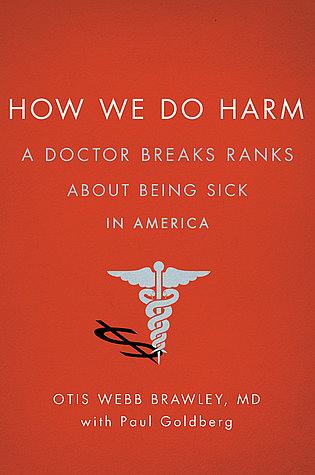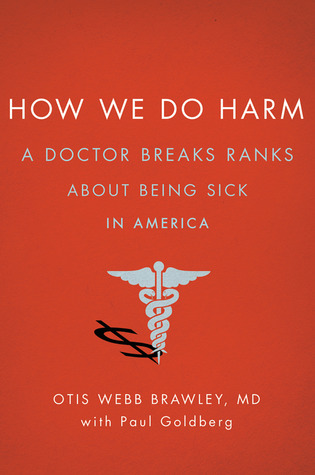How We Do Harm: Otis Brawley's new book skewers 'gluttony' of over-diagnosis, medical treatment

 The man known as Ralph DeAngelo had just turned 70 when his wife spotted a local hospital's newspaper ad for free prostate cancer screening, billed as a test that saves lives.
The man known as Ralph DeAngelo had just turned 70 when his wife spotted a local hospital's newspaper ad for free prostate cancer screening, billed as a test that saves lives.
To appease her, he went for a free PSA test, and was mailed a letter stating that his results were "significantly abnormal." In clockwork fashion, Ralph received 12 biopsies, a cancer diagnosis, prostate removal, radiation, a hole between his rectum and his bladder, a colostomy. He died of a related urinary tract infection.
Ralph's story is a cornerstone of an eye-opening new book, How We Do Harm: A Doctor Breaks Ranks About Being Sick in America, from Dr. Otis W. Brawley, chief medical and science officer of the American Cancer Society and its executive vice president.
Brawley takes aim at doctors who prescribe too much, drug companies who promise too much, and the system that rewards them with hefty incomes and sales. Patients can fuel that flawed system, he says, by accepting or insisting on a barrage of unnecessary tests.
In chilling detail, he describes how, at Ralph's request, he scrutinized his medical records. He concluded that the slightly elevated level of prostate-specific antigen in that original PSA test may have been caused-not by cancer-but by a swelling of the prostate gland common in older men.
His bottom line: "Patients need to understand that more care is not better care, that doctors are not necessarily right, and that some doctors are not even truthful."
I heard Brawley give a powerful call-to-action keynote address in Atlanta three weeks ago at the annual conference of the Assn. of Health Care Journalists.
He ripped apart a system in which the United States wins the No. 1 spot in health care spending, but ranks 50th among all nations in life expectancy. He questioned the efficacy and ethics of certain uses of cancer screenings such as the test that sent Ralph down the road to surgery, radiation and worse.
The speech brought hundreds of journalists to their feet, enthusiastically applauding. One reason for the ovation is that a number of journalists share Brawley's view about U.S. health care-many have also written about over-treatment-- but they rarely hear a high-level cancer researcher express such skepticism.
Some tweeted Brawley's comments in real time, such as this tweet from AHCJ president and ProPublica reporter Charles Ornstein: "Business plan: If you screen 1,000 men for prostate cancer, 145 will be abnormal. $3,500 charge for screening. Treatment $$$$$"
Such distrust is on the rise. Brawley is among a growing number of medical experts questioning what he calls the "gluttony" of over-diagnosis and treatment. Another is Dr. H. Gilbert Welch, a professor of medicine at the Dartmouth Institute for Health Policy and Clinical Practice.
Welch's new book is titled Overdiagnosed: Making People Sick in the Pursuit of Health. In a commentary last week in the Los Angeles Times, Welch admonished doctors, "Don't feel compelled to end every patient encounter with an order for a test, a recommendation for a procedure or a prescription for a medication."
Practicing physicians are taking up the call. On April 4, nine major physician groups released their lists of commonly prescribed tests and procedures in their fields that may not be necessary.
Brawley's book is a page-turner, rich with dramatic anecdotes.
I read half of it on my flight home to California from the Atlanta conference, finished it the next day and then reread key chapters. It has the sharp edge of an investigative piece, exposing morally questionable clinical tests, drug companies in search of the next big money-maker, doctors granting wealthy patients what it labels "irrational care."
It benefits from Brawley's own experiences growing up in urban Detroit and the Jesuit high school education that he credits for immersing him in skepticism. After medical school at the University of Chicago, he studied medical oncology at the National Cancer Institute and saw the workings of clinical trials first-hand. He is now a professor of hematology, oncology, medicine and epidemiology at Emory University.
He illustrates his premise with incisive patient snapshots, changing their names to preserve their privacy: the breast cancer patient doctor-shopping for unneeded chemotherapy that could harm her, the family that insists on "everything possible" to keep alive a cancer-ridden relative on the brink of a natural death.
In short, we're just as gluttonous as the doctors and drug firms that feed us, he writes.
Brawley notes that a panicked Ralph repeatedly asked for the strongest prostate cancer treatment, spurred on by blogs and Googled diagnoses on the Internet. But his doctors were happy to oblige rather than present him with studies and facts.
He lays out his famine-or-gluttony view of American health care: While wealthier Americans consume too much, often unwisely, poor Americans consume too little, especially preventative care.
He illustrates famine in a memorable opening scene set in Grady Memorial Hospital, a mammoth public institution in downtown Atlanta where he directed the cancer center.
A woman with breast cancer named Edna Riggs, 53, uninsured, waits in the emergency room, carrying an object wrapped in a moist towel. Her chart states her "chief complaint" as she reported it: "My breast has fallen off. Can you reattach it?"
Brawley questions her, determining that her breast cancer had been growing for nine years or more. Initially, she had limited insurance but could not get sick leave from her phone company job to seek treatment. Later her insurance grew too expensive to keep.
She delayed treatment as the tumor broke through the skin, leaving a gaping wound that became infected and smelled. She tried to conceal the odor with body powder and cologne.
Finally, the breast sprang free of her chest wall.
Despite her subsequent treatments at Brady, she died 20 months after entering the emergency room.
In this irrational system, patients like Ralph suffer from over-treatment, while the Edna Riggs get no treatment at all. Yet the system failed to keep either patient alive.
Critics of the Affordable Care Act have warned that it would spawn the rationing of health care, Brawley writes. He maintains, however, that health care is already being rationed, while money is poured into unproven care.
"I am more concerned about something else entirely: rational use of health care," he writes.
For such a skeptic, Brawley is refreshingly optimistic about the potential outcome of rational treatment based on science and known effectiveness.
"The money we would save would help us provide the most basic care for those who are now shut out of the system," he predicts. "Health care for the rich would benefit as well, because in medicine gluttony equals harm."
This post is reprinted with permission of the California Healthcare Foundation Center for Health Reporting.

